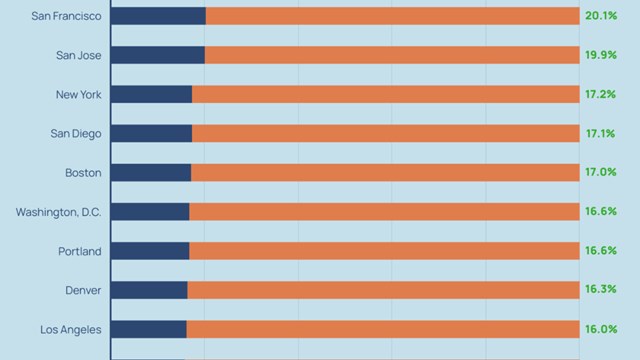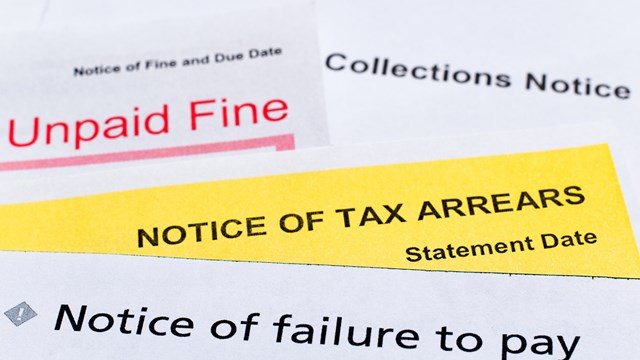It was comedian Jackie Mason who said," I have enough money to last me the rest of my life—unless I buy something." Mason was making a joke, but if your homeowners association isn't adept at managing its books, it might also be an unpleasantly accurate description of your community's finances.
"The best advice to keep financials in shape is not unlike good advice for keeping your body in shape," says Daniel Brown, a certified public accountant with the accounting firm of Rosenberg, Rich, Baker, Berman & Co., in Bridgewater. "It takes a commitment to do so, the effort to implement healthy practices, consistent check-ups, and strict adherence to professional advice." In short, it takes a formal system of checks and balances to back up a good old-fashioned, financial chestnut: Don't spend more than you earn—and put something away for a rainy day.
Crunching The Numbers
It might be a bit harder to follow simple advice these days. Financial statements, tax returns and audits are a bit heavier than simple checkbook management and something that many non-financial professionals and board members have trouble interpreting. Yet they are the very things that can tell you whether a homeowners association (HOA) is on track or not. Is the landscaping budget too high? Must operating costs be increased? Might some pattern of behavior even indicate that fraud has occurred? Even the most basic financial statements and tax returns begin to form a profile about the community—a profile that should serve as a working document that delivers some historic perspective, current status and indicator of future potential.
Decoding the Documents
Among the documents that aid a board and its financial advisors in steering their community through the sometimes-choppy waters of fiscal management are a few vital standouts that must be decoded and understood fully in order to—as Fairlawn-based CPA Karen Sackstein, says—"Paint a portrait of the financial position, provide a summary of the prior year's events, and show how income and expenses have been budgeted."
Some of those vital documents are the balance sheet, which outlines what a community has in the bank versus what it owes in one easy-to-digest form; the income statement, which covers all the HOA's bills and expenses for the year; the statement of cash flows, which reports cash receipts, payments, and the net change in cash resulting from the operating, financing, and investing activities of the association. Along with these repositories of important information are the monthly management reports, which include accounts receivable, cash disbursements showing bills were paid, accounts payable, the year-to-date budget, bank reconciliation, and copies of bank statements. Finishing off the pile is the audit, an annual report of the association's financial state.
To help boards make sense of all this arcane paperwork—and make it work for them—accountants like Sackstein often hold seminars for boards and come to their annual meetings. They make themselves available to teach the basics of reading a financial statement and field questions on how communities can improve their financial standing.
Gary Rosen, a CPA and CFE (Certified Fraud Examiner) at Wilkin & Guttenplan, an accounting firm located in East Brunswick, tells his clients to remember: "The statement belongs to the client." His job, as he sees it, is to "take the statements down to a lay person's understanding so that the board can read the footnotes—the roadmap for understanding financial statements." But, it is ultimately the board members on whom the fiduciary responsibility for the HOA rests. So, it is wise to heed a piece of advice echoed by many pros in the finance field: Use your accountant well. Make it a point to talk frequently, ask questions when they arise, and solicit advice and opinions. It is in the best interest of every community for the board to develop a cordial partnership with their financial advisors above and beyond an annual delivery of paperwork. It can be one of the best links to financial health that a board has access to.
What Lies Beneath
One of the most common problems that accountants pick up almost immediately from their financial investigating has to do with planning for the future. These are the reserve funds—the replacement savings for the roof, the sidewalks and other common areas that may not have been regular budget items for the past decade. It can be easy to lose sight of things that are not dealt with on an ongoing basis, yet these are exactly the times when HOA boards should be thinking and planning for large, future expenditures.
Rosen says that many associations regularly raise maintenance fees by a dollar or two, even in good years. This helps cushion future assessments for major capitol repairs and keep the reserve accounts funded, because as he sees it, "Live for today, plan for tomorrow." Associations need to meet today's operating budgets while planning for such unforeseen expenditures. Certainly, a community wouldn't want to be hit with several major replacement items in one year. To avoid such situations, Sackstein suggests that all communities undertake a reserve study. "It's usually done by independent engineers who inspect common areas—pool, roof, pumps, elevators, HVAC." These reports determine how long to replacement, what the costs might be and the savings needed to fund them. It provides a good baseline that can be updated every three to five years, says Sackstein, and paints a fairly accurate picture of what you can expect down the road.
Debts and Deficits
But reserve funds are just the beginning. According to Brown, good accountants pick up on "Variances from budgeted results, unusual sources of revenue or significant repair and replacement expenditures." Deficits, bad debts, low cash levels, and law suits all affect the financial health of a community, so having these numbers in good shape means health for the whole. Financial statements can even be used, says Brown, "To determine if there are any amounts for which the developer may be liable to the association," especially during the passing of ownership from developer to association members. And they can help keep track of owner delinquencies over the course of a year, which obviously have an affect upon income and need to be addressed.
But red-flagging these items early on is only half of the picture. The other is in making suggestions to lower costs, maintain cash flow, and look for trends in rising costs. Often, because accounting professionals may specialize in managed communities, they are in a good position to offer advice. For example, a community in one part of the state has made changes to lower their costs while retaining high level services; a great piece of information that can be passed along to others. New trends in services are discovered, or another community lowered their costs by implementing a new accounting system. Maybe a reserve study in one community resulted in saving that association a large sum of money by smarter budgeting and advance planning. These are just the sorts of things that using your accountant well can yield for you. They are the employee of the board and can provide incredibly helpful business advice that keeps your community in the best possible shape it can be.
With a good system of checks and balances, regular review and redirection when necessary, communities should operate in the black and free of legal problems. But, as many trusting individuals have found out the hard way, leaving the financial responsibility in the hands of a single individual can be a recipe for disaster. Professionals suggest the requirement of duplicate signatures on all issued checks, part of what is called 'segregation of duties.' It's just one more way of knowing that if something doesn't seem quite right, another pair of eyes may help. And it's a good idea to employ this theory not just in issuing checks, but also in purchasing services. Once again, it keeps someone's high-priced friend from being rewarded each and every contract when other comparable firms might provide the same services at substantially less cost.
Balancing Act
The good news is, once the board members really gain an understanding of their HOA's financial statement and work with their accountant to iron out any undesirable wrinkles, many of these problems can be easily resolved. Taking appropriate action is key, because one financial wrinkle begets another: excess spending leads to budget deficits, which may lead to dipping into reserves, which leads to further deficits. Getting a hold on what is currently going on, what is needed, what is the wisest course of action all rests upon understanding the financial status of the community and the ability to act upon that understanding.
Most professionals agree that once the final, audited financial statements have been reviewed and understood by the board, they may be shared with the entire community. The board does, after all, hold a fiduciary responsibility to the association and the shareholders. "All books and records are open for [inspection] at any time upon proper written notice," says Rosen. Owners do have the right to know how their community is being financially managed, and in cases when the information is not readily available, boards have been "put on notice." Certified letters to the board generally do the trick, but the threat of legal action is not unheard of, particularly when an unresponsive board may indicate less-than ethical behavior.
In the end, like healthy living, what's needed for financial health is balance. Financial statements and reports need to balance out. This year's savings should balance this year's expenditures. Board members should balance out duties by sharing responsibilities and management companies and boards should strike a balance by communicating with each other to sew up all the loose ends and get their respective jobs done.
"A study of economics usually reveals that the best time to buy anything is last year," said comedian Marty Allen. That's good Monday morning quarterbacking, but not the greatest financial management game plan. Equipped with understanding, a view of the bigger picture, and a committed team of advisors and financial professionals, however, your board can stay ahead of the game.
Chrysa M. Smith is a freelance writer, who resides in Bucks County, Pennsylvania.







2 Comments
Leave a Comment